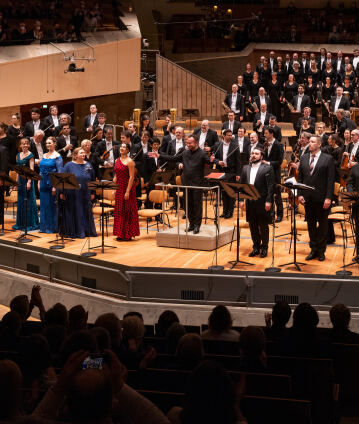Kirill Petrenko conducts Tchaikovsky’s “Iolanta”

Pyotr Ilyich Tchaikovsky’s last opera, Iolanta, is tender, magical and ambiguous. The focus of the story is a blind princess, who regains her sight through love – a rare happy ending in 19th-century opera. Tchaikovsky composed poetic music for the work, in which we also hear his love for French opera. You can enjoy this unjustly forgotten gem in a performance conducted by Kirill Petrenko with Asmik Grigorian in the title role.
Almost all of Tchaikovsky’s music dramas end tragically or at least – like Eugene Onegin – very sadly. But the composer’s last opera, Iolanta, of all things, concludes with a happy ending. This is also because the plot comes from the world of fairy tales, where things often turn out happier than in real life. The king’s daughter Iolanta is blind, but has not been told about her origins or that other people can see. She falls in love with a friend of her fiancé, who in turn loves someone else. The king ultimately gives both couples his blessing. But above all, the titular heroine is given her sight at the end.
The libretto, written by Tchaikovsky’s brother Modest, is based on a Danish play. At about 100 minutes, the opera is relatively short, as the composer conceived it as part of a double bill that also included the premiere of the ballet The Nutcracker in St Petersburg in 1892. The short prelude confines itself to low notes, hinting at the darkness of blindness, before Tchaikovsky does everything he can to build a beautiful sound world for his main character. One of the early admirers of the opera, whose music repeatedly echoes Tchaikovsky’s idol Mozart, was Gustav Mahler, who conducted the first performances in Hamburg and Vienna.
For Kirill Petrenko, who conducts the work as one of three Tchaikovsky operas in the 2021/22 season, Iolanta, which is virtually unknown in Germany, shows an astonishing kinship with musical Symbolism, which established itself as a central style in early Modernism, especially in France.
© 2022 Berlin Phil Media GmbH
Category
Artists
Our recommendations
- Kirill Petrenko conducts Strauss’s “The Woman without a Shadow”
- Kirill Petrenko conducts Tchaikovsky’s “Queen of Spades” in Baden-Baden
- Kirill Petrenko with Puccini’s “Madama Butterfly”
- Kirill Petrenko conducts Strauss’s “Elektra” at the Easter Festival in Baden-Baden
- Kirill Petrenko with Strauss’s “Die Frau ohne Schatten” in Baden-Baden
- Kirill Petrenko conducts Tchaikovsky’s “Queen of Spades”